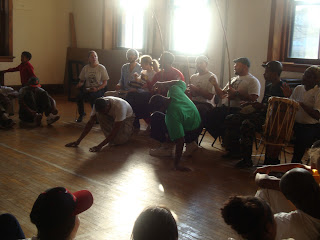CELEBRATING THE DIASPORA
Oberlin Ohio, December 2011
DANCE AND MAGIC
Four Angoleiros (practitioners of Capoeira Angola) departed from New York City, to Oberlin, Ohio for a Capoeira Conference. During the trip, we talked about Capoeira, and reflected on Mestre Joao Pequeno’s life and passing away, which happened a day before. The voyage was quite pleasant, the moon was full and the atmosphere was filled with positive vibrations.
Upon arrival, we greeted the other angoleiros, and immediately went to rest. The following morning, we played and practiced for a couple of hours. Then, Justin Emeka, lead us into a “bate-papo” (informal conversation). Each participant shared a little insight of his or her Capoeira journey. The conversation was taken to a higher level when one of the angoleiros broke into tears while sharing how his life had changed through Capoeira. I cried with him. I felt that those tears were of gratitude, “saudade” (longing), and happiness. The thought that Capoeira was born in him and he was reborn in Capoeira instantly came to me. He stated that through Capoeira he had gone to Aruanda (a magical place), which was very profound. People talked about their frustrations, motivations, aspirations, and accomplishments in Capoeira and how it has impacted their lives. After the “bate-papo” we enjoyed a delicious meal at the Oberlin College Campus Cafeteria, which was followed by the children’s class and the roda (Circle).

To the sound of the berimbaus, the atabaque (drum), pandeiros, reco-reco, e agogo, beautiful singing voices were heard, and challenging games of Capoeira were enjoyed. Angoleiros came from Philadelphia, Boston, Canada, and New York City to celebrate the Diaspora - Mestre Chicago, his wife Kiameshia and their three beautiful children (Nailah, Geronimo, and Freedom-also great angoleiros), Contra Meste Chorao, Roque Bomfim, Chike, Tagen, Nina, Mtambusi, Martin, and Lucia. The roda was filled with much dance, “floreio”, “mandinga”, acrobatics, and several “jogos bonitos” (beautiful games). People from different places and backgrounds, including Brazil, Angola, Jamaica, Nigeria, the USA, Ghana, Eritrea, etc. joined in the name of Capoeira Angola to celebrate the Diaspora and life. The roda ended nicely, and some of the visitors left that same evening of Sunday.
On Monday morning, some of the visitors had the honor to be part of another great roda. This time, the college students had more time to play. I was happy to “dance”/play/jogo with them - I just wanted to dance… and felt very positive vibrations in the air. So much inspiration came from the moment when I was singing a “ladainha” and one of the players, who was about to start playing, shed tears of joy and appreciation.
On the way back to NYC we talked about how eager and inspired we were. Capoeira can inspire beyond what one can imagine. Capoeira can give tools to help you accomplish your dreams and goals in life. It will allow you to create and fly. Capoeira is BEAUTIFUL and TRANCENDENTAL!
Lúcia Kudielela Fernandes
Co-Founder of Capoeira Africana Movement
PORTUGUÊS
CELEBRANDO A DIASPORA
Oberlin Ohio, Dezembro 2011
DANÇA E MAGIA
Quatro Angoleiros partiram da cidade de Nova Iorque à Oberlin, Ohio, para uma conferêcia de Capoeira. Durante a viagem, falamos sobre Capoeira e reflectimos na morte de Mestre João Pequeno, que havia acontecido um dia antes. A viagem foi agradável, a lua estava cheia e a atmosfera estava preenchida de vibrações positivas.
Na chegada, cumprimentamos os outros angoleiros, e logo depois fomos descansar. Na manhã seguinte, jogamos e treinamos por algumas horas. Depois do treino, Justin Emeka, nos guiou para um “bate-papo”. Cada participante compartilhou um pouco sobre a sua jornada na Capoeira. A conversa foi levada à um nível mais alto, quando um dos angoleiros começa a chorar enquanto falava sobre como a sua vida tivera mudado através da Capoeira Angola. Eu chorei com ele. Senti que aquelas lágrimas eram de gratidão, saudade, e felicidade. O pensamente que Capoeira nasceu nele, e ele foi renascido na Capoeira me veio espontaneamente. Ele disse que através da Capoeira, ele foi a Aruanda (lugar mágico), o que foi muito profundo. Os presentes falaram sobre suas frustações, motivações, aspirações, e realizações dentro da Capoeira, e como ela tem impactado as vidas deles. Depois do bate-papo, comemos uma refeição deliciosa na Cafetaria do Campus da Faculdade de Oberlin, que foi seguida pela aula das crianças e a roda.
Ao som do berimbau, do atabaque, pandeiros, reco-reco e agogo, belas vozes cantantes foram escutadas, e jogos desafiantes de capoiera foram desfrutados. Angoleiros vieram de Filadelfia, Boston, Canada, e Nova Iorque para celebrar a Diaspora; Mestre Chicago, sua esposa Kiameshia, e os seus três lindos filhos (Nailah, Geronimo, and Freedom – também bons angoleiros), Contra Mestre Chorão, Roque Bomfim, Chike, Tagen, Nina, Mtambuzi, Martin, and Lucia. A roda estava cheia de dança, floreio, mandinga, acrobacías, e vários jogos bonitos. Pessoas de diferentes lugares e experiências, tais como Brazil, Angola, Jamaica, Nigeria, Estados Unidos, Gana, Eritreia, etc. juntaram-se em nome de Capoeira Angola para celebrar a Diaspora e a vida. A roda acabou agradavelmente, e alguns dos visitantes partiram naquela mesma noite de domingo.
Na segunda-feira de manhã, alguns dos visitantes tiveram a honra de participar numa outra roda formidável. Desta vez, os estudantes universitários tiveram mais tempo para jogar. Eu estava contente por dançar e jogar com eles - Eu só queria dançar... e senti vibrações muito positivas no ar. Grande inspiração veio do momento em que eu estava cantando uma ladainha, e um dos jogadores, que estava prestes a iniciar um jogo, deitou lágrimas de alegria e apreciação.
No caminho de volta a Nova Iorque, falamos sobre o quanto ansiosos e inspirados todos nós estavamos. Capoeira é capaz de inspirar uma pessoas além do que ela pode imaginar. Capoeira dá ferramentas que podem ajudar na realização de seus sonhos e metas na vida. Ela te permite criar e voar. Capoeira é BONITA e TRANSCENDENTE!
Lúcia Kudielela Fernandes
Co-Fundadora do Movimento Capoeira Africana
















